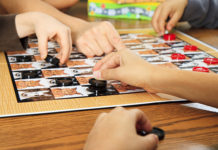“Kids these days. They can’t take their eyes off their phones!” “Why don’t you ever talk to your friends who are right next to you instead of following people on social media you don’t even know!” Very likely, you have either uttered or heard such statements over the last few years. Adults all around are looking at the next generation with a sense of despair, not understanding how they will ever manage in life being so strongly bound to their devices.
As much as we would like to believe that it really is just “these kids”, we must take an honest look at ourselves. I have spoken to many teenagers who have complained to me about the lecturing they receive from parents and teachers, all the while, those very same adults are allowed unfettered and unlimited access to all the things they are preaching are so dangerous. High school students have relayed that they are even afraid of getting in a car with their parents because of how often their parents take their eyes off the road to make a call or send a text. Perhaps most disheartening, when asked if they could change one thing about how technology has affected their lives, many adolescents have answered- “I wish my parents would pay more attention to me than their phone.”
It’s Parenting 101. Children will always learn more from their parents’ behaviors than from their words. It’s simply the way our brains are wired. We tend to internalize that which we see more than that which we hear. Even on a basic level, actions are more prevalent than words. When a parent yells at a child to stop yelling at their sibling, all the child internalizes is that Mommy and Daddy yell, so I can also. The only way to truly impart the lessons of life to our children is by being role models for them. Showing them how to act instead of just lecturing to them.
As a society, we are starting to realize the impact that smart phones and other smart devices have had on us. We have begun to take steps, if even just small ones, to ensure that our children are no longer growing up attached to their phones. But at the end of the day, the most important step we must take is to look in the mirror and think about how we, as adults, are setting the example. Do our children see us texting away as they get off the bus from school or are they greeted with attention and warmth? Is dinner a time when the family comes together to talk about their day and share positive experiences or is it a time when Mommy and Daddy have to take care of something “very important” on their phones and they will be right back? How do we begin and conclude Shabbos? If we are on our phones until the very last moment before candle-lighting and then right back on them even before we make havdalah, why should we expect our children to be any different?
Imagine the statement we would be making to our children if every home had a shelf or box right by the front door to deposit our phones as we entered into the house. Each day our children would see us pushing aside the distractions and the outside world in order to hear about their day at school. Not only would they know they are the priority in our lives, they would be exposed to a shining example of how to prioritize in their own lives. Imagine if our children saw that when Mommy and Daddy go out for a walk or are simply having a conversation, they put their phones away and look at each other in the eyes. We could then feel confident that our children will do the same with their spouses. Imagine if our children watched us turn our phones off before we entered a shul or even left the phone in the car. How much more would they value their time in shul if they saw us placing our relationship with Hashem above all else!
It was known that Rav Naftali Zvi Yehudah Berlin, the Rosh Yeshiva of the Volozhin Yeshiva in the late 19th century, had a resolution to bring all of Jewry back to Torah and mitzvos. When asked how he intends to accomplish this lofty goal, the Netziv responded, “I will be a living example of what it means to follow every halachah in the Shulchan Aruch. Anyone who sees me will see a complete Jew and know how to return to the Torah.”
We all want what’s best for our children. For them to grow up fostering healthy relationships, with others and with Hashem. If we can lead by example, guiding our children with our actions, we can then watch with pride as they are catapulted forward into the life we envision for them.







